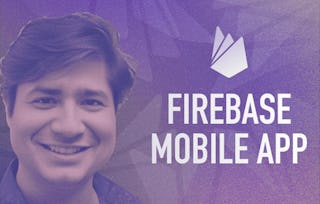In today's mobile-first world, over 90% of people access the internet via mobile devices (Statista) creating a high demand for professionals with strong mobile app development skills. In this course, part of the IBM iOS and Android Mobile App Developer Professional Certificate, you'll gain essential skills for adding notifications, storing data and publishing mobile apps for Android and iOS.

Mobile App Notifications, Databases, & Publishing

Mobile App Notifications, Databases, & Publishing
This course is part of multiple programs.


Instructors: SkillUp
3,475 already enrolled
Included with
13 reviews
Recommended experience
What you'll learn
Job-ready mobile app back-end services skills employers look for in less than one month
How to apply user interface principles to create intuitive, visually appealing mobile apps and integrate notifications to enhance user engagement.
How to publish your app in marketplaces and implement marketing strategies.
How to enhance mobile apps with databases like SQLite and cloud services like Firebase.
Skills you'll gain
- Databases
- Application Development
- User Interface and User Experience (UI/UX) Design
- Android Development
- Mobile Development
- Google Analytics
- iOS Development
- Back-End Web Development
- Application Performance Management
- Flutter (Software)
- Marketing Strategies
- Application Deployment
- Apple iOS
- Database Management
- React Native
- Skills section collapsed. Showing 8 of 15 skills.
Details to know

Add to your LinkedIn profile
14 assignments
See how employees at top companies are mastering in-demand skills

Build your subject-matter expertise
- Learn new concepts from industry experts
- Gain a foundational understanding of a subject or tool
- Develop job-relevant skills with hands-on projects
- Earn a shareable career certificate

There are 5 modules in this course
This module introduces you to notifications and UI design when building a mobile app. You also learn about placing media, such as images, audio, and video, into your apps. Through hands-on labs, you will apply what you’ve learned about notifications, well-designed UI, media, and appropriate user interactions to create a seamless and engaging mobile app.
What's included
7 videos3 readings3 assignments4 app items4 plugins
This module introduces you to the use of databases in mobile app development. You compare two types of databases, embedded and remote, and then focus on their uses in mobile app development. You will explore the different features of these databases and apply best practices when using them in mobile app development in the hands-on labs. You will explore many features of the back-end-as-a-service platform, Firebase, widely used in mobile app development. By the end of the module, you will know when and how to implement both types of databases and use them effectively when creating mobile applications.
What's included
10 videos2 readings3 assignments9 app items5 plugins
This module explores the publishing process and marketing strategies for your mobile applications. You will learn how to publish apps on both iOS and Android platforms, as well as explore techniques to market your apps and provide first-rate user support post-launch. You will enhance your app's visibility and learn how to pique potential users' interest and curiosity about your app.
What's included
7 videos2 readings3 assignments3 app items5 plugins
This module focuses on the steps for preparing for and releasing both Flutter and React Native apps for both the iOS and Android mobile operating systems. It includes building these apps using the Xcode and Expo platforms, testing automation, and tracking post-release performance with analytics. You will get hands-on experience in the labs with best practices for preparation and publishing, as well as submitting your app to the Apple App and Google Play stores.
What's included
7 videos3 readings4 assignments3 app items3 plugins
In this module, you will complete a culminating project that ties together the topics you’ve learned in the course. In this scenario-based project, you create a mobile app named PostifyMe. The app will showcase mobile UI design principles by allowing users to create a shareable, multi-media diary using video, images, and audio. You will use the Firebase as the back-end service to manage notifications and data interactions. The three main steps that you will perform while working on the project are setting up the back end, creating multiple GUI screens, and testing your app.
What's included
1 video2 readings1 assignment2 app items1 plugin
Earn a career certificate
Add this credential to your LinkedIn profile, resume, or CV. Share it on social media and in your performance review.
Instructors


Offered by
Explore more from Mobile and Web Development
 Status: Preview
Status: Preview Status: Free Trial
Status: Free Trial Status: Free Trial
Status: Free Trial Status: Free TrialStatus: AI skills
Status: Free TrialStatus: AI skills
Why people choose Coursera for their career

Felipe M.

Jennifer J.

Larry W.

Chaitanya A.

Open new doors with Coursera Plus
Unlimited access to 10,000+ world-class courses, hands-on projects, and job-ready certificate programs - all included in your subscription
Advance your career with an online degree
Earn a degree from world-class universities - 100% online
Join over 3,400 global companies that choose Coursera for Business
Upskill your employees to excel in the digital economy
Frequently asked questions
Google's Firebase platform offers tools for building and managing mobile and web applications. In mobile app development, Firebase is widely used for its back-end services, such as real-time databases, authentication, cloud storage, and hosting. It simplifies processes like syncing app data across devices in real-time, managing notifications and storing multimedia content. Developers use Firebase to enhance app functionality without managing complex server infrastructure, making it ideal for faster, scalable app development on Android and iOS platforms.
Learning about notifications and user interface (UI) is essential because it allows you to create apps that are both engaging and easy to use. A strong UI ensures your app is intuitive and visually appealing, making it more likely that users will enjoy using it. Notifications help you keep users connected, providing timely updates, reminders, and personalized information that drive interaction. By mastering these skills, you'll be able to build apps that not only attract users but also keep them engaged, increasing the chances of long-term success for your projects.
Learning how to market a mobile app is crucial for its success in a competitive landscape. Effective marketing strategies help you reach your target audience, increase visibility, and drive downloads. Without a solid marketing plan, even the best app can go unnoticed. Additionally, understanding user feedback and analytics can guide future improvements, ensuring your app meets user needs and stands out in app stores.
More questions
Financial aid available,

